All The Lies In The First 12 Minutes Of Esports World Cup Documentary “Level Up”
The EWC has managed to produce a true landmark in esports propaganda that will have Riot Games and Activision Blizzard taking notes
By now most esports fans will be aware of the existence of the “Esports World Cup,” the Saudi Arabian state’s domestic foray into esportswashing. Repurposed from the Gamers8 festival in order to tap into the world of competitive gaming, the EWC has tried very quickly to synthesize credibility in a space where most true fans wield potent bullshit detectors. So far, despite tens of millions of dollars being thrown at the project, it has failed to convince the esports audience it is authentic… There’s something about the participants bleating in unison about how great it is, the contrived marketing and the same old celebrities for hire acting as mouthpieces that just give the game away. People aren’t buying it and so, right on cue, we get a five-part documentary series dropped into the slop section of Amazon Prime.
Before we get into it, there are a few things to know about why the Esports World Cup exists in the first place. Most obviously it is part of the continued “bread and circuses” domestic policy of the Saudi Arabian kingdom’s Vision 2030 project, designed to extricate itself from relying on its oil to remain culturally influential. In addition to that it also enables Saudi to control pretty much all the esports industry by essentially underwriting the costs of participants, as well as offering other publicly unspoken incentives for cooperation. Finally, and I’m sure you have noticed this, it is ultimately constructed in a way that Falcons will almost certainly win it. Why do you think other attending organisations enter far fewer teams than the Saudi Arabian hometown heroes? After Saudi’s entrance into multiple sports the lessons are clear. They want total control of the space, all roads must in some way lead back to Riyadh and where possible Saudi Arabian nationals must be beneficiaries, either in work appointments or in hollow victories.
With all that in mind it makes total sense to create a documentary series that not only creates the illusion that all these things are just organic, the inevitable positive outcomes from the royal family’s interest, but also to rewrite history for the benefit of those who don’t know any better. It is propaganda in the purest sense, filled to the brim with convenient inaccuracies, glaring omissions and blatant lies. Even the initial press release made it sound as if a SONY production team simply stumbled across the event and were compelled to make this series about it. Alas, the credits give the game away… “All rights reserved Esports World Cup foundation” at the very end. This was commissioned and as such can’t be regarded as a documentary in the traditional sense. It’s purpose isn’t to document anything other than what those involved with EWC want to tell you and it turns out what they want to tell you is a series of easily disprovable fabrications.
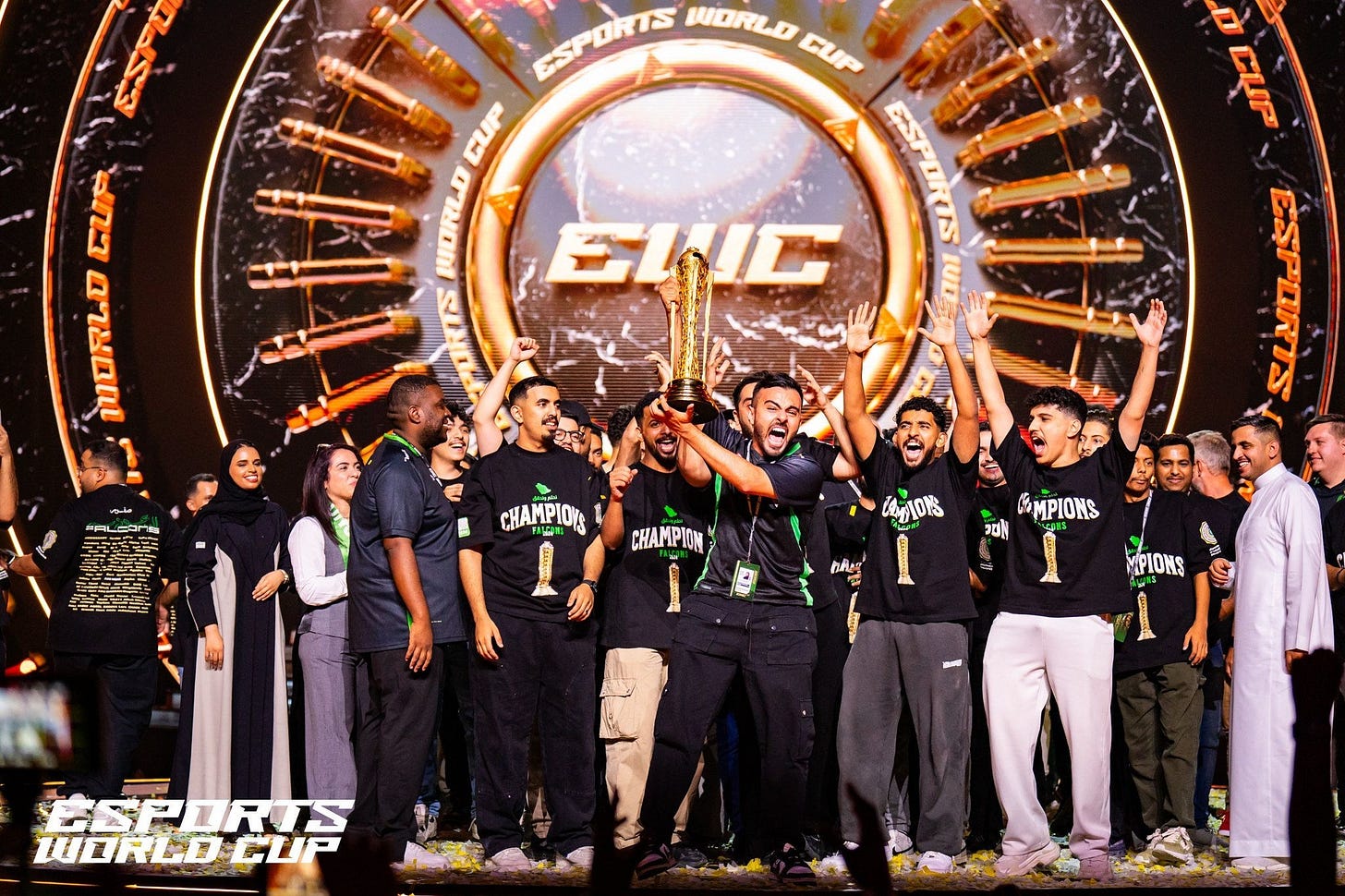
While it is my aim to review the whole series – spoiler, it’s terrible – right out the gate I wanted to demonstrate how absurd the series is in terms of how it frames both the EWC event and the Falcons organization. I would wager even someone with relatively little understanding of esports history knows something is off… The way the documentary cuts around crowd shots because of the tonal disconnect of the “biggest event” having little attendance… The way the narrative suggests pursuit of the trophy is competitive when in actuality Falcons, by design, win it at a canter… The constant recurring use of the phrase “life changing money” from the online promotional material that suggests no other esports competition has a prize pool that comes close.
While I certainly wouldn’t recommend watching the whole series, especially if you are an industry person that hasn’t been bought off, it’s worth watching the first twelve minutes of the first episode just to see how densely packed the set-up is with weapons grade bullshit. However, just in case you don’t have the time or inclination I’ll break down every ridiculous thing they say in that span of time.
Background commentary states “this is the Superbowl, World Cup and Olympics rolled into one.”
You might consider it a cheap shot to start with what is clearly a statement of self-aggrandizing designed to hype the event, but it only gets worse from here. Direct comparisons to the World Cup and Olympics don’t seem to make sense as, while the event has teams from across the globe, their nationalities play no part in the event itself.
Perhaps they are referring to prestige then. Well, if we look at that metric it’s hard to believe any serious esports competitor would consider a World Cup victory, which is contingent on other titles that they may know little to nothing about, superior to the best competitions in their field. For instance, The International for Dota will always be considered career defining for those who have won it and those who haven’t. It is also an event that has earned multiple comparisons to The Superbowl for at least seven years and Valve never had to tell anyone to make that connection.
Equally the EWC does not replace League of Legends World Finals, nor a Counter-Strike Major, nor a PUBG Global Championship or the Starcraft 2 tournaments of yesteryear. For the smaller esports titles, it might well be a Superbowl of sorts but that is mainly by virtue of the prize pool and little else. Even games that have fallen by the wayside of popularity, such as Overwatch, have previous events that will be more highly regarded than anything that occurs in Riyadh.
At approximately 2 minutes and 15 seconds, a snippet of commentary says “Falcons vs Liquid… Bitter rivals since the dawn of esports”
While it’s hard to say for sure, this piece of commentary sounds like two pieces of footage spliced together. That would at least make sense as it is hard to imagine any professional commentator stating the above, even if they were relatively new to the work.
For context, Team Liquid are one of the original esports organisations, having been founded in 2000 by Victor Goossens. They grew from being a Starcraft “clan” based in the Netherlands to become one of the most successful and best run multi-gaming organisations (MGOs) in the world today. By contrast, Team Falcons didn’t come into existence until 2017 and focused primarily on FIFA until things changed in 2021 when an influx of money enabled them to expand into multiple titles. Since then, they have used finances from investors that, according to the organisation’s CEO, “wish to remain private” and have enough rosters to all but guarantee success in a format like the EWC.
So, Falcons were not in existence at the dawn of esports and weren’t competitively relevant until about 2020 if we’re being generous. How then could they and Team Liquid have any kind of rivalry, let alone a bitter one? Analyzing the games where they have competed also shows this statement to be laughable. Dota 2 might be arguably Falcons most successful esports division thus far and while Falcons have beaten Liquid more times than not since 2023, the year they were established, it’s not much of a rivalry. Falcons beat Liquid in exactly one event final, BetBoom Dacha Dubai 2024. Compare that to 2023 when Gamin Gladiators beat Liquid four finals, three of them in a row, as well as beating them in the final of 2024’s “Riyadh Masters” at the EWC and you can see what a genuinely bitter rivalry might look like.
In Counter-Strike their teams have barely played each other and never in a high-stakes environment, let alone for a trophy. They’ve met in Rocket League once, they don’t seem to have competed directly in Apex Legends, the same for Valorant, the same for League of Legends… The list goes on. In addition to this if you simply look at the comparative trophy haul of the two orgs – Team Liquid having won over 75 major trophies, Team Falcons a fraction of that if you discount their smaller regional tournament victories – and you can see that these two organisations are not even in the same universe.
The reality is that for the purposes of the documentary, with the narrative being that Team Liquid had a genuine shot of winning the EWC when they entered five fewer events than Falcons, their rivalry had to be “established” even if it has no basis in reality.
The recurring use of the phrase “life changing amounts of money”
Not so much a lie as a semantic argument that is repeated across all the promotional materials for the tournament. Let’s be clear, esports has been handing out “life changing amounts of money” for years and years. Tournaments like League of Legends Worlds, The International, the Counter-Strike Majors, Fornite’s World Cup, Arena of Valor, Call of Duty and PUBG have all held competitions with prize pools in the millions of dollars if not tens of millions. The very best players have become millionaires and even where that isn’t the case they have enjoyed a standard of living far above what they would have had in the timeline where they didn’t pursue esports. There’s nothing unique about what the EWC is doing.
The framing across the documentary is as if no other tournaments have ever offered “life changing” prizes but that of course isn’t true. For instance, the first episode revolves around the Call of Duty: Warzone tournament which, of course, Falcons win. The prize pool for that tournament is $1 million, admittedly the largest on the calendar, with the winner taking home $200,000. However, the second highest tournament of that year was the World Series of Warzone Global Finals, held in Las Vegas. That “only” had a prize pool of $950,000 however the winner of that tournament (incidentally Falcons as well) was awarded $300,000. Now by my estimations that makes it 100,000 more “life changing” dollars in the non-EWC competition but why split hairs?
The Esports World Cup is referred to as the “biggest trophy of the year”
While this was a passing piece of commentary, across the series the notion that the Esports World Cup is the “biggest” trophy in the eyes of participating organisations comes up constantly. It isn’t clear by what metric they mean but ultimately none of them really stand up to any scrutiny.
You could make an argument that it is based on prize money but that may or may not be true. For instance, we don’t know what the prize pool for the next Dota International will be as the crowd funding element of it hasn’t begun yet. The recent prizes have been significantly smaller than past years due to Valve’s change of direction for the Battle Pass, there’s every chance that they do something different this time around and the prize pool ends up eclipsing the $3 million allocated for Dota in Riyadh. In League of Legends the World Championship has a prize pool of $5 million, more than double competitors will be awarded at the EWC. In Counter-Strike the prize pool matches that of a Major with $1.25 million. Rocket League’s World Championship hands out $200,000 more than EWC. Again, we can go on. For a handful of tournaments this argument can be made but not really for any S-tier esports.
Viewership then? Well, again not really. League of Legends at the EWC had a 1.1 million peak, which sounds impressive until you compare that to the 2.8 million enjoyed by MSI 2024 just a couple of months beforehand. The World Championships boasted 6.9 million excluding Chinese viewership. Counter-Strike managed to get up to 756,000+ but that pales in comparison to the numbers put up by Copenhagen and Shanghai’s Majors that year, 1.8 million and 1.3 million respectively. The competition featured in this first episode, Call of Duty: Warzone, achieved 135,281 peak viewership compared to 286,630 for the aforementioned Las Vegas event.
Factor in to this the arguments about prestige and history and it’s not clear in which way it is the “biggest trophy of the year” beyond net spend. A lot of money has gone into this very inorganic competition and a lot of the social media interactions around it feel forced, whether it’s the contractually mandated cringe-inducing replies from participating organisations or the YouTube videos that get a ridiculous disproportionate number of views to comments and shares. It is a physically large trophy though so this argument can be made literally without any valid critique.
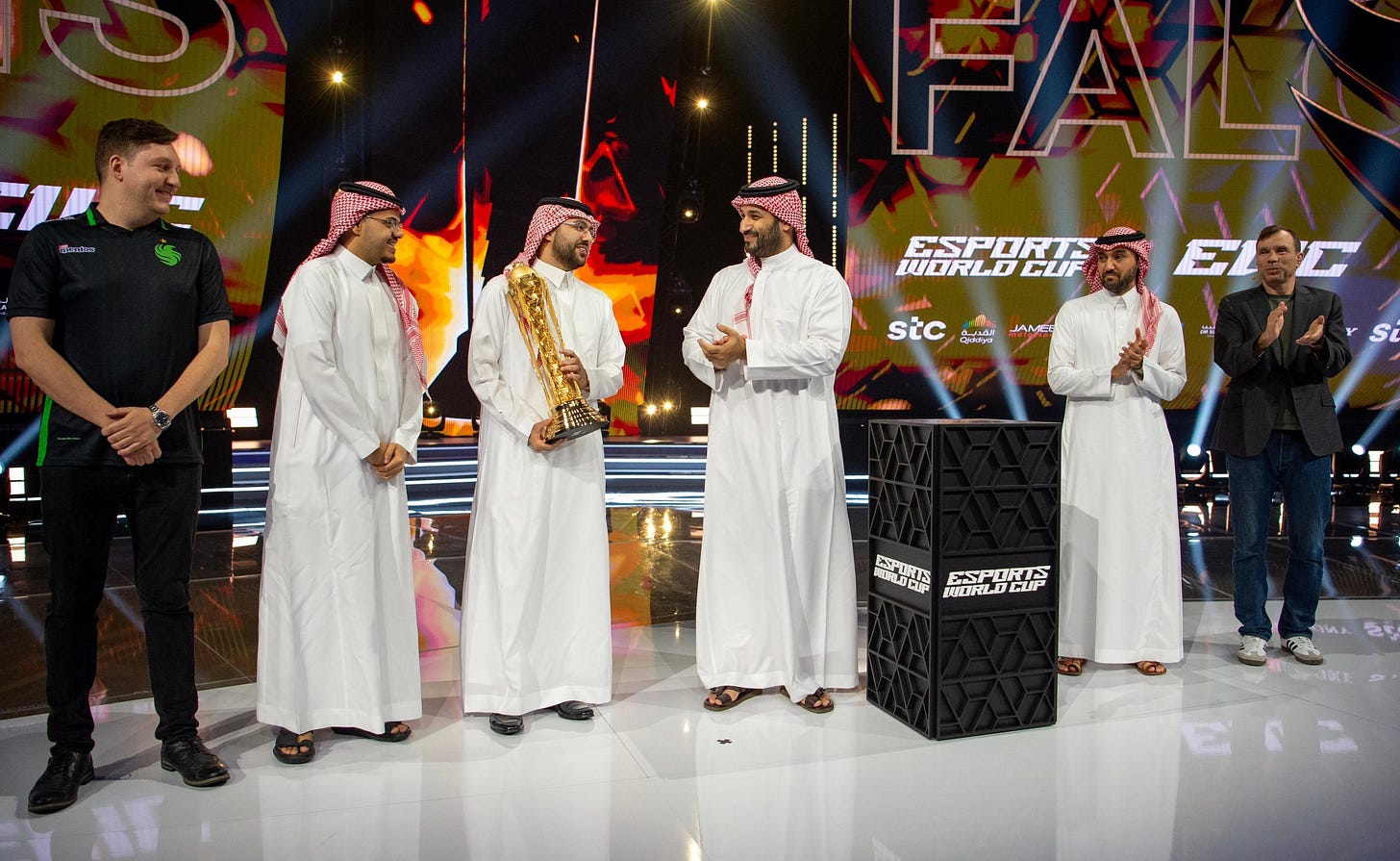
Ralf Reichert: “The Crown Prince himself came up with the idea”
Like all good propaganda it is essential to pay tribute to the glorious leader. Ralf Reichert, co-founder of ESL and now kingpin of the Esports World Cup, states that this elaborate esports competition was the idea of Crown Prince Mohammed bin Salman Al Saud. While much has been made in the media about how the Crown Prince is a huge gamer, the gulf between casual play and understanding the intricacies of competition across multiple titles is vast. It is also a matter of record that while Reichert was still at ESL they worked closely with contacts to set up the acquisition by the Savvy Games Group, funded by the Saudi Arabian Public Investment Fund (PIF) and as a requirement of accessing those funds appointed MBS as the chairman of the company.
While it’s not beyond the realm of possibility that the Crown Prince was aware of esports and maybe even would have liked tournaments in Riyadh, the narrative he is the progenitor of the Esports World Cup looks incredibly unlikely. What is more likely is that esports veterans such as Reichert, having negotiated one deal with the PIF, moved across to a new state funded entity and used their expertise to repurpose the Gamers8 festival to something more esports focused with MBS’s blessing.
Patrik “cArn” Sättermon: “It’s a milestone in esports… It’s the first time we are gathering our teams competing exclusively under the fnatic umbrella against other multi-title organisations.”
This quote from fnatic’s CGO is something of a car crash. I can’t disagree that the EWC is a milestone in esports. It is certainly the first time a state has decided to underwrite an entire tournament ecosystem for their own political purposes. It must also be said though that beyond that it’s hard to decipher what Patrik meant beyond trying to promote the tournament as something far greater than it actually is.
The statement “it’s the first time we are gathering our teams competing exclusively under the fnatic umbrella against other multi-title organisations” makes no sense because that is literally the premise of every esports tournament. Fnatic’s line-ups go to events such as the Intel Extreme Masters, which have multiple titles being competed in at once. This fits the description Patrik is saying is a “milestone.”
So, let’s be charitable and assume he meant it was the first time “multi-title organisations” competed across multiple disciplines with the victories contributing to an organisation being crowned an overall winner. If that was the case, he would of course be lying as well. The Championship Gaming Series (CGS), a $60 million creation of David Hill and News Corporation, operated a similar format between 2007-2008. Each participating organisation had to field a Counter-Strike: Source (CS:S) team as well as entrants in Dead Or Alive 4, Forza Motorsport 2 and FIFA 2008. Each tournament contributed points towards a total and the organisation with the highest number of points was awarded $1 million.
While Patrik was at that time an active competitor in Counter-Strike 1.6 and his team did not participate in the CGS, it’s impossible to imagine he wasn’t aware of its existence. It was widely criticized for choosing CS:S as its version of Counter-Strike by professional 1.6 players, with several luminaries from that scene lobbying for CGS to change their mind and pick their version. It also represented a huge bump in prize money given that the record set for a 1.6 prize pool was in the region of $200,000 at that time.
CGS was of course a spectacular failure and many, especially those involved, have attempted to downplay its existence, particularly when other disasters popular with the esports grifter class such as the Overwatch League emulated its structure. Regardless, it remains absolutely incorrect to say that this is the first time this has happened.
OJ Borg: “What that [The existence of the EWC] has meant is an arms race for talent.”
OJ can be forgiven as he may not be aware of the minutiae of why this apparent “arms race” is occurring. Many organisations have suddenly gone out and picked up new teams and players in titles they haven’t participated in before for the sole purpose of entering them into the EWC. This isn’t the full story though as it overlooks the fact that the EWC, via its World Cup Club Program, provides a stipend for organisations that essentially underwrites the cost of having these teams. In essence, you can think of it as being paid to enter the competition because having all the big names do so adds an air of credibility that it may not have without their attendance. It also appears in some cases that there have been agreements with the EWC to bring in certain personalities for the function of further promoting the event and bringing it closer to the Olympics, such as the inclusion of chess as an “esport.”
The so-called “arms race” is ultimately just teams taking advantage of a slush fund to cover the costs of a team they would not have otherwise recruited. There are also doubts about the long-term future of players and teams either side of the EWC or should the EWC ever decide to stop funding the organisations in this way. More succinctly, this is part of the agreement and if for any reasons things drastically change with how the EWC operates the interest in beating Falcons and winning the EWC through funding competitive talent will change rapidly.

A montage of Vitality’s Anne Banschbach, Gaimin Gladiators Joseph Turner, G2’s Alban Dechelotte and Team Liquid’s Steve Arhancet parroting that Falcons are the “biggest competition” for each of their respective organisations.
Part of the documentary’s narrative is framing Falcons as anything other than an organisation enjoying massive handouts through its investors and state sponsor of the Saudi Telecom Company. Here formerly self-respecting executives pretend that Falcons are in some way the “biggest competition” for each of them. While that might be true exclusively for the EWC it’s not true for similar reasons listed above for Team Liquid.
To be clear, Falcons outside of the EWC have not been a broadly successful organisation. Their Rocket League team has been outstanding, almost flawless, and their Dota 2 team was the team of 2024. Apex Legends has started excellently for them in 2025 and we’ve already highlighted their strong Warzone placements. Considering they are playing with “house money” so to speak it’s not a fantastic return and it’s certainly reasonable to say that they don’t engage in the same level of scouting and forethought as other organisations when it comes to recruitment. Their strategy is simple – buy the best at almost at any cost and then pretend they didn’t spend any money to acquire them. It’s highly unlikely that in private conversation these storied and tenured organisations would view them as their biggest competition except for when it comes to keeping any of their players who actually win things.
It's worth noting that despite winning the EWC at a canter Falcons still only won two competitions at the event out of the eighteen in which they participated. Team BDS from Switzerland can make the same claim. An Esports Award for esports organisation of the year might add some credence to the belief they are the entity to be envious of but then you remember the Saudi Arabian state did a deal with those awards too, that they are tacked on to the end of the EWC and that mysteriously as long as you’re in good standing with the Riyadh clique you can win.
Grant Rousseau: “The assumption is Mossad and I went out and spent millions/ It’s just… I mean, that is a natural reaction when you see the calibre of players we’re signing. I get it.”
Since saying this, Grant Rousseau has… Parted ways with the organisation. One wonders how he’ll view his time there, like making the one-finger Islamic salute and pretending it’s to say Falcons are “number one.”
But I digress. It’s an objective fact that Falcons have spent millions of dollars to acquire the rosters they have and that they pay exorbitant salaries to the best of talent on their roster. It’s not a secret. Falcons like to downplay that their success comes from money, but they simply hoover up whatever they want knowing desperate esports orgs run into the ground by incompetent executives can’t say no to the cash. They can have any player they want in any game and when that’s the case it requires little insight to figure out a good strategy. Despite that, they’ve had high profile embarrassing failures like their Counter-Strike division which alone must have conservatively cost them a total of $8 million thus far.
Falcons are not a typical esports organisation and while the goals may appear the same as everyone else’s – to acquire talent capable of winning tournaments for the sake of promotion – theirs is very different. They must be successful to show Saudi competence, to infer that anything Saudi Arabia and the royal family touches is destined to be prosperous. Fortunately for them the pressure to achieve that is alleviated by their contributors and close connections to the Saudi Arabian state. They are not operating in the same plane of existence as everyone else has been historically speaking.





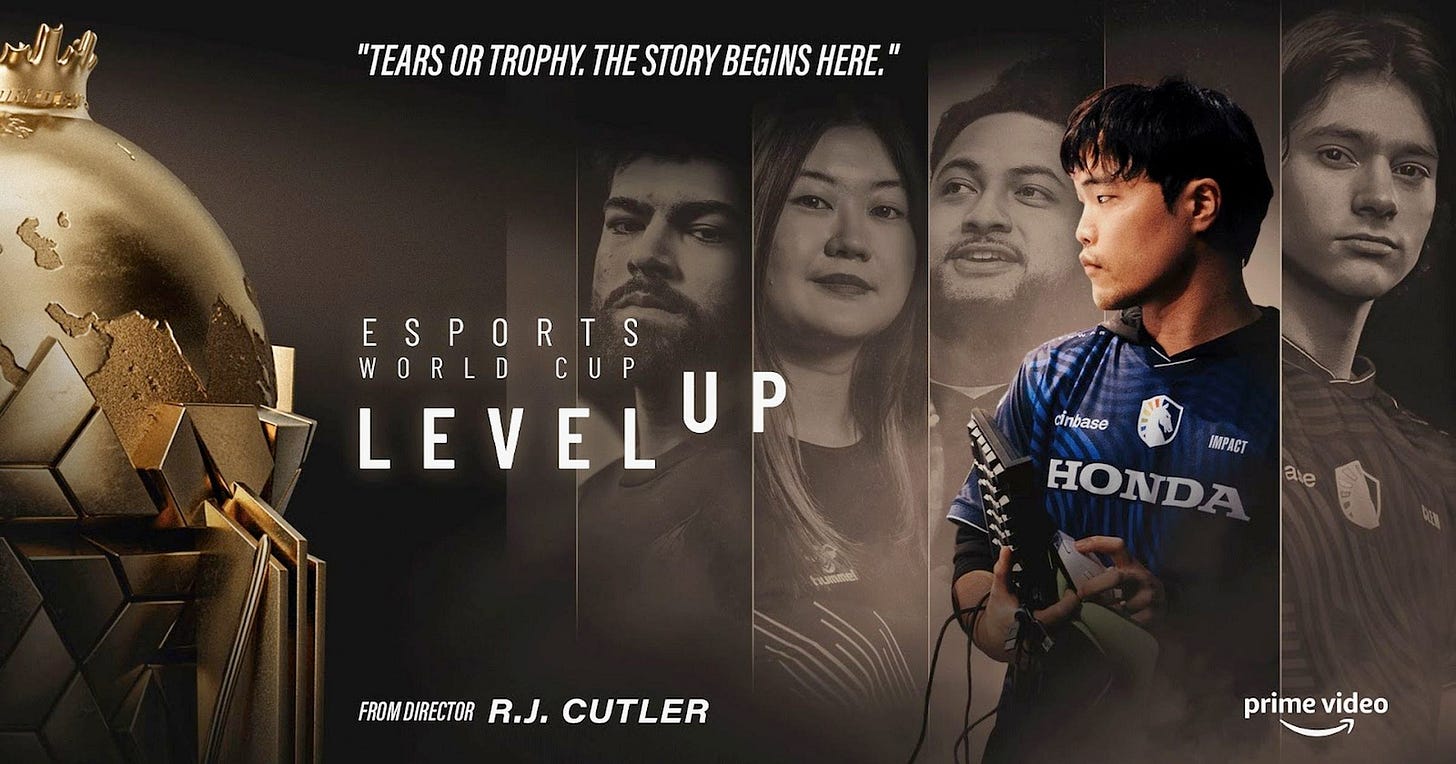
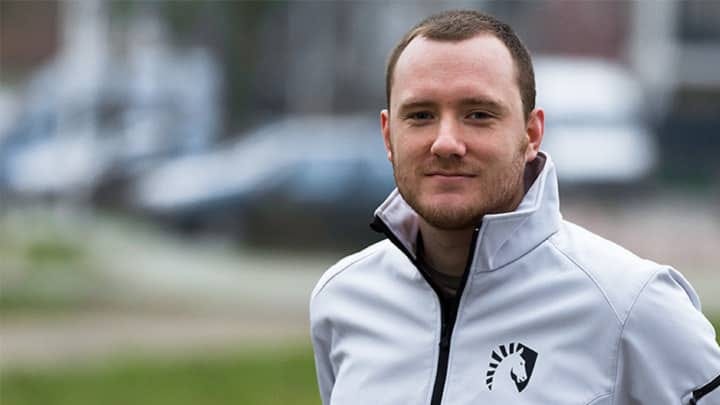

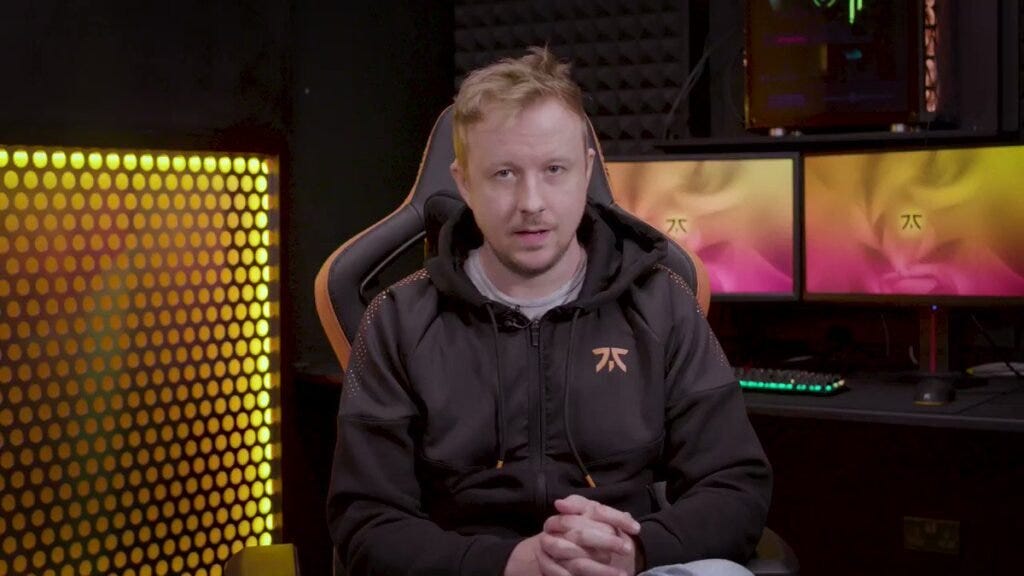
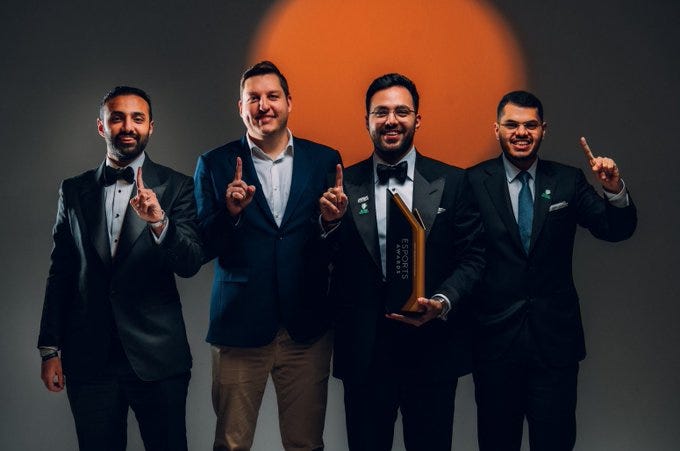
They level up now
Nicely done, Richard.